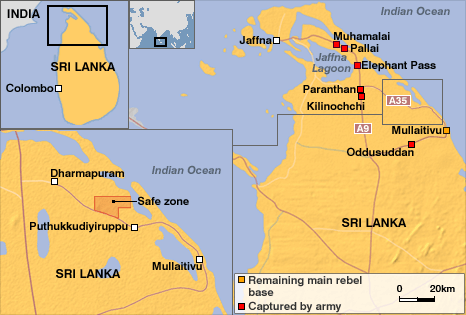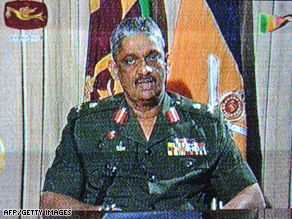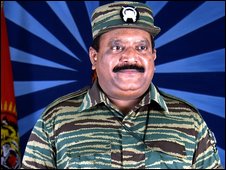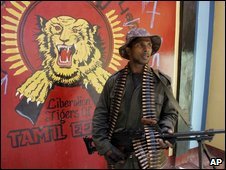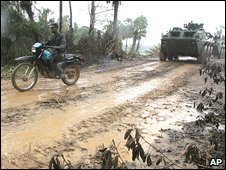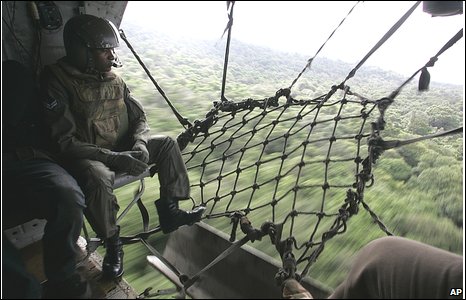- Reaction score
- 1
- Points
- 410
Sri Lanka says troops have captured rebel capital
Fri. Jan. 2 2009
The Associated Press
Fri. Jan. 2 2009
The Associated Press
COLOMBO, Sri Lanka -- Government forces captured the Tamil Tigers' de facto capital in northern Sri Lanka on Friday, dealing a devastating blow to the rebels' quarter-century fight for an independent state, the president said.
But in a sign the rebels retained their ability to strike back, a suspected Tamil Tiger suicide attacker on a motorcycle detonated a bomb near the air force headquarters in the heart of Colombo during Friday's afternoon rush hour, killing two airmen, police spokesman Ranjith Gunasekara said.
The attacker, who was targeting troops as they left work, wounded 30 other people, including nine airmen, he said.
The blast pierced the festive mood that had swept across the capital after President Mahinda Rajapaksa announced the fall of Kilinochchi in a nationally televised speech.
"Our brave and heroic troops have fully captured Kilinochchi, which was considered the main bastion of the LTTE," he said, referring to the rebels by their formal name, the Liberation Tigers of Tamil Eelam. "For the last time, I call upon the LTTE to lay down their arms and surrender."
Across Colombo, people lit firecrackers, danced in the streets and waved Sri Lankan flags.
Kilinochchi held great symbolic value as the centre of the Tamil Tigers' de facto state and its capture by government forces for the first time in a decade was sure to badly damage the rebels' morale. The rebels used the town as their headquarters and created structures for an independent state, such as police, courts and tax offices.
But the rebel-affiliated TamilNet website said the Tamil Tigers had moved their headquarters further to the northeast before the town fell. Kilinochchi does not lie along a key crossroads or house major rebel bases or armories, and military analysts said its strategic value was not great.
Rebel officials were not immediately available for comment, but they have said in the past that they would fight on even if Kilinochchi fell.
The rebels have fought since 1983 to create an independent homeland in the north and east for Tamils, who have suffered decades of marginalization by successive governments controlled by the Sinhalese majority. The conflict has killed more than 70,000 people.
The United States, European Union and other nations have called for a political solution to the crisis, saying that warfare will not resolve the deep, underlying tensions between the Tamil and Sinhalese communities that created the violence in the first place.
The army first captured Kilinochchi from the rebels in 1996, but lost it in a rebel counterattack in 1998.
The government has predicted repeatedly over the last two months that the town was about to fall. But the rebels built a massive, 17 kilometre-long earth and moat fortification, and fierce resistance from the guerrillas and pounding monsoon rains made it difficult for government forces to advance. The battles reportedly killed hundreds of fighters.
Army troops cleared the way into the town Thursday when they captured a key crossroad north of Kilinochchi that allowed them to close in from three directions, the military said.
Troops entered Kilinochchi Friday morning, said Lakshman Hulugalle, a military spokesman. Senior military officials said their forces met only minimal resistance once in the town, an apparent sign that the rebels had withdrawn and retreated to their jungle bases, analysts said.
Army commander Lt. Gen. Sarath Fonseka said Friday that troops had taken control of most of the north's largest highway, which runs through the spine of the country. Troops were "attacking the fleeing terrorists," he said.
He said troops were now focused on pushing into the rebels' last major stronghold of Mullaittivu and estimated that only 1,700 to 1,900 rebels remained.
"We are confident that we can see the end of them within this year," he said. "We don't need even a year to see their end."
The government had previously vowed to end the war by the end of 2008.
But Tamil Tiger political leader Balasingham Nadesan told The Associated Press on Tuesday that the rebels began as a guerrilla group and would be able to keep fighting even if they lost much of the territory they controlled in the north.
Since renewed fighting flared three years ago, the government has driven the Tamil Tigers out of their strongholds in the east and forced them to retreat from much of their northern territory.

